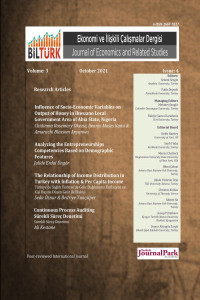Araştırma Makalesi
Sayı Editör Kurulu




Amaç ve Kapsam
BİLTÜRK, The Journal of Economics and Related Studies is a peer-reviewed international journal that analyzes problems in all areas of the economy and related fields of economy. The Journal focuses on the publication of both theoretical and empirical publications in the field of economics and the related studies.
BİLTÜRK Journal of Economics and Related Studies includes but is not limited to the following subjects. the following subjects.
Financial Economics, International Economics, Microeconomics, Welfare Economics, Economics of Education, Economic History, Economics of Law, Defense Economics, Industrial Organization, International Trade, Labor Economics, Money, Banking, Public Finance, Political Economy, Islamic Economics, Tourism Economics
Yazım Kuralları
Manuscript Submission
Articles not published or submitted for publication elsewhere accept in either Turkish or English.
Manuscripts should not exceed single-spaced 20 A4 pages with the Times New Roman 12-font character size.
Only DergiPark platform welcomes for article submissions.
http://dergipark.gov.tr/journal/2848/submission/start
The first page
Title Page
The title page should include:
The name(s) of the author(s)
A concise and informative title
The affiliation(s) and address(es) of the author(s)
The e-mail address, and telephone number(s) of the corresponding author
If available, the 16-digit ORCID of the author(s)
Abstract
Please provide an abstract of 100 to 250 words. The abstract should not contain any undefined abbreviations or unspecified references.
Keywords
Please provide 2 to 4 keywords which can be used for indexing purposes.
Classification code
JEL
An appropriate number of JEL codes should be provided. This classification system is prepared and published by the Journal of Economic Literature, see
https://www.aeaweb.org/econlit/jelCodes.php?view=jel
Text
Text Formatting
Manuscripts should be submitted in Word files.
Headings
Please use the decimal system of headings with no more than three levels.
Abbreviations
Abbreviations should be defined at first mention and used consistently thereafter.
Footnotes
Footnotes can be used to give additional information, which may include the citation of a reference included in the reference list. They should not consist solely of a reference citation, and they should never include the bibliographic details of a reference. They should also not contain any figures or tables.
Footnotes to the text are numbered consecutively; those to tables should be indicated by superscript lower-case letters (or asterisks for significance values and other statistical data). Footnotes to the title or the authors of the article are not given reference symbols.
Always use footnotes instead of endnotes.
Acknowledgements
Acknowledgements of people, grants, funds, etc. should be placed in a separate section on the title page. The names of funding organizations should be written in full.
Tables
Tables, figures and graphs should be numbered consecutively and contain full references. The titles of the tables, figures and graphs should place at the heading of them; the references of tables, figures and graphs should place at the bottom of them. Decimals should separate by a comma. Equations should number consecutively. Equation numbers should appear in parentheses at the right margin. The full derivation of the formulas (if abridged in the text) should provide on a separate sheet for referee use.
Citation
Please follow the APA guidelines for choosing heading levels, style, citation and references.
Etik İlkeler ve Yayın Politikası
Publication Ethics: The publication process at BİLTÜRK, The Journal of Economics and Related Studies is the basis of the improvement and dissemination of information objectively and respectfully. Therefore, the procedures in this process improve the quality of the studies. Peer-reviewed studies are the ones that support and materialize the scientific method. At this point, it is of utmost importance that all parties included in the publication process (authors, readers and researchers, publisher, reviewers and editors) comply with the standards of ethical considerations. BİLTÜRK, The Journal of Economics and Related Studies expects all parties to hold the following ethical responsibilities. iThenticate, Turnitin or intihal.net can bu used for professional plagiarism detection and prevention.
The following ethical duties and responsibilities are written in the light of the guide and policies made by Committee on Publication Ethics (COPE).Ethical Responsibilities of Authors: The authors who submit their manuscripts to BİLTÜRK, The Journal of Economics and Related Studies are expected to comply with the following ethical responsibilities:
Author(s) must submit original studies to the journal. If they utilize or use other studies, they must make the in-text and end-text references accurately and completely.
People who have not contributed to the study at the intellectual level should not be indicated as author.
If the manuscripts submitted to be published are subject of conflicting interests or relations, these must be explained.
During the review process of their manuscripts, author(s) may be asked to supply raw data. In such a case, author(s) should be ready to submit such data and information to the editorial board. Author(s) should document that they have the participants' consent and the necessary permissions related with the sharing and research/analysis of the data that are used. Author(s) bears the responsibility to inform the editor of the journal or publisher if they happen to notice a mistake in their study which is in early release or publication process and to cooperate with the editors during the correction or withdrawal process. Authors cannot submit their studies to multiple journals simultaneously. Each submission can be made only after the previous one is completed. Author responsibilities given in a study (e.g., adding an author, reordering of author names) cannot be changed if the review process has begun. Ethical Responsibilities of Editors: The editors of BİLTÜRK, The Journal of Economics and Related Studies should hold the following ethical responsibilities that are based on the guides "COPE Code of Conduct and Best Practice Guidelines for Journal Editors" and "COPE Best Practice Guidelines for Journal Editors" published as open Access by Committee on Publication Ethics (COPE). General duties and responsibilities: Editors are responsible for each study published in BİLTÜRK, The Journal of Economics and Related Studies. The editors' responsibilities:
cess of their manuscripts, author(s) may be asked to supply raw data. In such a case, author(s) should be ready to submit such data and information to the editorial board.
Author(s) should document that they have the participants' consent and the necessary permissions related with the sharing and research/analysis of the data that are used.
Author(s) bears the responsibility to inform the editor of the journal or publisher if they happen to notice a mistake in their study which is in early release or publication process and to cooperate with the editors during the correction or withdrawal process.
Authors cannot submit their studies to multiple journals simultaneously. Each submission can be made only after the previous one is completed.
Author responsibilities given in a study (e.g., adding an author, reordering of author names) cannot be changed if the review process has begun.
Ethical Responsibilities of Editors: The editors of BİLTÜRK, The Journal of Economics and Related Studies should hold the following ethical responsibilities that are based on the guides "COPE Code of Conduct and Best Practice Guidelines for Journal Editors" and "COPE Best Practice Guidelines for Journal Editors" published as open Access by Committee on Publication Ethics (COPE).
General duties and responsibilities: Editors are responsible for each study published in BİLTÜRK, The Journal of Economics and Related Studies.
The editors' responsibilities:
Making efforts to meet the demand for knowledge from readers and authors,
Ensuring the continuous development of the journal,
Managing the procedures aimed to improve the quality of the studies published in the journal,
Supporting intellectual freedom and Ensuring academic integrity,
Following the procedures without making concessions on intellectual property rights and ethical standards,
Being transparent and clear in issues that require correction or explanation.
Editors must make decisions taking into consideration the knowledge, skills and expectations of all readers, researchers and practitioners that they need. Editors must also ensure that the published studies should contribute to literature and be original. Moreover, they must take notice of the feedback received from readers, researchers and practitioners and provide explanatory and informative feedback.
Relationships with Authors: Editors have the following duties and responsibilities in their relations with authors:
Editors must make positive or negative decisions about the studies' importance, originality, validity, clarity in wording and suitability with the journal's aims and objectives.
Editors must take the studies that are within the scope of publication into pre-review process unless there are serious problems with the study.
Editors must not ignore positive suggestions made by reviewers unless there are serious problems with the study.
New editors, unless there are serious issues, must not change the previous editor's decisions about the studies.
"Double-Blind Review and Review Process" must be published and editors must prevent possible diversions from the defined processes.
Editors must publish an "Author's Guide" that is comprehensive enough in answering queries by authors. This guide must be updated regularly.
Authors should be provided with explanatory and informative feedback.
Relationships with Reviewers
Editors have the following duties and responsibilities in their relations with reviewers:
Editors must;
choose reviewers according to the subject of the study.
provide the information and guidance reviewers may need during the review process.
observe whether there are conflicting interests between reviewers and authors.
keep the identities of reviewers confidential in blind review.
encourage the reviewers to review the manuscript in an unbiased, scientific and objective tone.
evaluate reviewers regularly based on criteria like performance and timing.
develop practices and policies that increase the performance of reviewers.
take necessary steps to update the reviewer pool dynamically.
prevent unkind and unscientific reviews.
make effort to ensure the reviewer pool has a wide range.
Relationships with the Editorial Board:
must make sure that the members of the editorial board follow the procedures in accordance with the publication policies and guidelines, and must inform the members about the publication policies and developments. The editors must also train new members of the editorial board and provide the information they need.
Moreover, editors must
ensure that the members of the editorial board review the manuscripts in an unbiased and independent manner.
select the new members of the editorial board from those who can contribute to the journal and are qualified enough.
send manuscripts for review based on the subject of expertise of the editorial board members.
regularly communicate with the editorial board.
arrange regular meetings with the editorial board for the development of publication policies and the journal.
Relationships with the Journal's Owner and Publisher
The relationship between the editors and publisher is based on the principle of the independency of editors.
Editorial and Blind Review Processes
Editors are obliged to comply with the policies of "Blind Review and Review Process" stated in the journal's publication policies. Therefore, the editors ensure that each manuscript is reviewed in an unbiased, fair and timely manner.
Quality Assurance
Editors must make sure that articles in the journal are published in accordance with the publication policies of the journal and international standards.
Protection of Personal Information
Editors are supposed to protect the personal information related with the subjects or visuals in the studies being reviewed, and to reject the study if there is no documentation of the subjects' consent. Furthermore, editors are supposed to protect the personal information of the authors, reviewers and readers.
Encouraging Ethical Rules and Protection of Human and Animal Rights
Editors are supposed to protect human and animal rights in the studies being reviewed and must reject the experimental studies which do not have ethical and related committee’s approval about the population given in such studies.
Precautions against possible Abuse and Malpractice
Editors are supposed to take precautions against possible abuse and malpractice. They must conduct investigations meticulously and objectively in determining and evaluating complaints about such situations. They must also share the results of the investigation.
Ensuring Academic Integrity
Editors must make sure that the mistakes, inconsistencies or misdirections in studies are corrected quickly.
Protection of Intellectual Property Rights
Editors are responsible for protecting the intellectual property rights of all the articles published in the journal and the rights of the journal and author(s) in cases where these rights are violated. Also, editors must take the necessary precautions in order to prevent the content of all published articles from violating the intellectual property rights of other publications.
Constructiveness and Openness to Discussion
Editors must
pay attention to the convincing criticism about studies published in the journal and must have a constructive attitude towards such criticism.
grant the right of reply to the author(s) of the criticized study.
not ignore or exclude the study that include negative results.
Complaints: must examine the complaints from authors, reviewers or readers and respond to them in an explanatory and enlightening manner.
Political and Economic Apprehensions
Neither the owner of the journal, publisher or any other political or economical factor can influence the independent decision taking of the editors.
Conflicting Interests
Editors, acknowledging that there may be conflicting interests between reviewers and other editors, guarantee that the publication process of the manuscripts will be completed in an independent and unbiased manner.
Ethical Responsibilities of Reviewers
The fact that all manuscripts are reviewed through “Blind Review” has a direct influence on the publication quality. This process ensures confidentiality by objective and independent review. The review process at BİLTÜRK, The Journal of Economics and Related Studies is carried out on the principle of double blind review. Reviewers do not contact the authors directly, and the reviews and comments are conveyed through the journal management system. In this process, the reviewer comments on the evaluation forms and full texts are assigned to the author(s) by the editor. In this context, the reviewers doing review work for BİLTÜRK, The Journal of Economics and Related Studies are supposed to bear the following ethical responsibilities:
Reviewers must
agree to review only in their subject of expertise.
review in an unbiased and confidential manner.
inform the editor of the journal if they think that they encounter conflict of interests and decline to review the manuscript during the review process.
dispose the manuscripts they have reviewed in accordance with the principle of confidentiality after the review process. Reviewers can use the final versions of the manuscripts they have reviewed only after publication.
review the manuscript objectively and only in terms of its content and ensure that nationality, gender, religious and political beliefs, and economic apprehension do not influence the review.
review the manuscript in a constructive and kind tone, avoid making personal comments including hostility, slander and insult.
review the manuscript they have agreed to review on time and in accordance with the ethical rules stated above.
Ethical Responsibilities of Publisher: the publisher of BİLTÜRK, The Journal of Economics and Related Studies , is a non-profit foundation. Therefore, the Board of BİLTÜRK, The Journal of Economics and Related Studies is conscious of the fact that they must observe the ethical responsibilities below and act accordingly:
Editors are responsible for all the processes that the manuscripts submitted to BİLTÜRK, The Journal of Economics and Related Studies will go through. Within this framework, ignoring the economic or political interests, the decision-makers are the editors.
The publisher undertakes to have an independent editorial decision made.
The publisher bears all the responsibility to take the precautions against scientific abuse, fraud and plagiarism.
Unethical Behavior
Should you encounter any unethical act or content inBİLTÜRK, The Journal of Economics and Related Studies apart from the ethical responsibilities listed above, please notify the journal by e-mail at bilturkdergi@gmail.com
BİLTÜRK Journal of Economics and Related Studies is an Open Access journal and provides immediate open access to its contents. The Journal aims to promote the development of global Open Access to scientific information and research.
BILTÜRK Journal of Economics and Related Studies Creative Commons Attribution-NonCommercial-ShareAlike 4.0 International (CC BY-NC-SA 4.0) altında çalışmaktadır. https://creativecommons.org/licenses/by-nc-sa/4.0
Ücret Politikası
Free of Change
Dizinler
Atıf Dizinleri
Diğer Dizinler
Dergi Kurulları
Editors in Chief


Editors


Editorial Boards

Junus Ganiev, yüksek lisans ve doktora derecelerini Kırgızistan-Türkiye Manas Üniversitesi İktisat Bölümü'nden almıştır. Yüksek lisans tezini enflasyon dinamikleri, doktora tezini ise yolsuzluk üzerine yapmıştır. Para politikası, uluslararası ekonomik ilişkiler, ekonomik büyüme ve kalkınma konularında araştırmalar yapmaktadır. Birçok ülkede uluslararası konferanslara katılmıştır. Makaleleri, kitap bölümleri, kitapları, konferans bildirileri bulunmaktadır. Kırgızistan-Türkiye Manas Üniversitesi İktisadi ve İdari Bilimler Fakültesi İktisat Bölümü'nde tam zamanlı Doçent olarak görev yapmaktadır. ORCID: 0000-0001-8859-5464 (Djal, Campus of Chyngyz Aitmatov, Bishkek, 720038, Kyrgyzstan, +996772 331193, junus.ganiev@manas.edu.kg)




Prof. Dr. NACİ TOLGA SARUÇ
Kişisel Bilgiler
E-posta: naci.saruc@istanbul.edu.tr
Web: https://avesis.istanbul.edu.tr/naci.saruc
Posta Adresi: İstanbul Üniversitesi Merkez Kampüsü 34452 Beyazıt/Fatih-İstanbul Tel: 0 (212) 440 00 00
Uluslararası Araştırmacı ID'leri
ScholarID: D7nVXw4AAAAJ
ORCID: 0000-0003-0716-3040
Publons / Web Of Science ResearcherID: AAA-7387-2020
Yoksis Araştırmacı ID: 118804
Eğitim Bilgileri
Doktora, University of Leicester, Social Sciences, Economics, Birleşik Krallık 1995 - 2001
Yüksek Lisans, University of Leicester, The Faculty Of Social Sciences, Economics, Birleşik Krallık 1994 - 1995
Lisans, Dokuz Eylül Üniversitesi, İktisadi Ve İdari Bilimler Fakültesi, Maliye Bölümü, Türkiye 1987 - 1992
Yabancı Diller
İngilizce, C1 İleri
Yaptığı Tezler
Doktora, The determinants of tax evasion: Experiments with Turkish subjects , University Of Leicester, Social Sciences, Economics, 2001
Yüksek Lisans, Privatisation of Water Industry in England and Wales, University of Leicester, Social Science Faculty, Economics, 1995






Prof.Dr.Ahmet AK
Ankara Hacı Bayram Veli Üniversitesi İİBF Maliye Bölümü Öğretim üyesi Ankara Maliye Okulu ve Çukurova Üniversitesi İİBF / İşletme Bölümünden mezun oldu. Anadolu Ü. SBE / Mali Hukuk Yüksek Lisans ve Mali Hukuk Doktora programlarını tamamladı.
Yüksek Lisans tez konusu; “GVK Açısından Vergi İdaresi ile Vergi Yargısı Arasındaki Yorum Farklılıkları ve Vergi Yargısı Kararlarının Vergi İdaresi Üzerindeki Etkileri”, Doktora tez konusu ise; “Vergi Yasalarının Hazırlanması, Yasama Süreci ve Türkiye Uygulaması” dır.
Meslek hayatına vergi memuru olarak başlayan AK, 14 yıl Vergi Müfettişi ve 4 yıl da Gelir İdaresi Grup Müdürü olarak görev yaptı. Akademik hayatına 2009 yılında Yard. Doç. olarak başlayan AK, 2010 yılında Doçent, 2012-2013 ABD Kansas Üniversitesinde Doç. misafir öğretim üyesi, 2015 yılında Prof. Dr. Bilecik Şeyh Edebali Üniversitesi, 2017 yılında Prof. Dr. Gazi Üniversitesi ve 2018 yılında ve halen Ankara Hacı Bayram Veli Üniversitesinde Prof. Dr. Olarak görev yapmaktadır. Kurucu Maliye Bölüm Başkanlığı, Mali Hukuk Ana Bilim Dalı Başkanlığı, Üniversite ve Fakülte Kurulları üyeliği gibi görevlerde de bulundu. Akademik düzeyde Fransızca ve İngilizce bilmektedir.
Birçok ulusal ve uluslararası projede yürütücü, danışman ve eğitim görevlisi olarak yer aldı. Akademik alanda çok sayıda makale, kitap ve bilimsel çalışmaları yayınlanmıştır. Vergi Yargılama Hukuku (Vergi Davaları) Vergi Uyuşmazlıkları ve İdari Çözüm Yolları, Vergi Hukukunda İştirakler, Vergi Hukuku, Vergi Ceza Hukukunda Suç ve Kabahatler başlıklı kitapları ile alanında bir çok ulusal ve uluslararası kitaplarda bölüm yazarlığı bulunmaktadır. Gazi, Ankara Hacı Bayram Veli, Bilecik Şeyh Edebali ve Dumlupınar Üniversitesinde Lisans ve Lisans üstü düzeyde dersler vermiştir. Tevhidi Düşünce Açısından Vergi Felsefesi konusunda da çalışmalar yapmaktadır.
Vergi Yasalarının Hazırlanması, Mükellef Hakları, Türk vergi Sistemi, Vergi Yargılama Hukuku ve İçtihat Analizi, Vergi Sosyolojisi, Vergi Hukuku, Vergi Ceza Hukuku, Vergi İcra Hukuku ve Uluslararası Vergilendirme konuları genel uzmanlık alanlarıdır.
Merkezi Kaliforniya’da bulunan ΦΒΔ Honor Society For International Scholars tarafından “Uluslararası Bilim Adamı Onur Madalyası” ve Topluluk üyeliğine (2013) layık görüldü.
2013/Haziran ve 2014/Haziran dönemlerinde Polonya Czestochowa University of Technology’de misafir Öğretim Üyesi olarak görev yaptı. (Halen Bilim Kurulu Üyesi / https://pea-journal.eu/scientific-committee.html )
2015 Hindistan’da (Devi Ahilya Üniversititesi) düzenlenen “Invitation for International Conference of Patel Group of Institutions (ITESM – 2015)” başlıklı uluslararası konferansa Türkiye’yi temsilen katıldı “Evaluation of the Effects of Globalization on the Taxes for Income from International Financial Investment in Turkey in Terms of the OECD Model (Taxation on Dividends)” konulu çalışmasıyla 123 çalışma arasında Uluslararası En İyi Araştırma “International the Best Paper” ödülüne layık görüldü.
“The Possible Effects of Personal Income Tax and Value Added Tax on Consumer Behaviors” başlıklı makalesi Harvard Üniversity ve Cornell University tarafından yayınlanmıştır. https://ui.adsabs.harvard.edu/abs/2019arXiv191003141A/abstract ;
https://arxiv.org/abs/1910.03141?fbclid=IwAR0ICFVYA6h3r2iaZsaxZdjkqFFkz0HoDwbDil5VvN6ITDE0VnSm44B1fbo
Segull Publications: Director in Board of Development ve International Journal of Tax Economics and Management IJTEM, Yönetim Kurulu Başkanı ve Baş Editörü
Tevhidi Düşünce Derneği Yönetim Kurulu Başkan Yardımcısı ve İLMAR (İlmi ve Metodolojik Araştırmalar Derneği) Yönetim Kurulu üyesi.








































